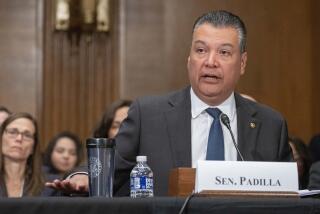900-Line Calls Give You a Headache? Call 900- . . . : Lifestyles: The industry that brought you dial-up horoscopes, sex and phony job opportunities is offering advice from doctors, lawyers, pharmacists, counselors.
- Share via
NEW YORK — The 900 telephone business has given callers plenty of headaches, all right. If you are one of them, you can now, well, call a 900 number for advice on what to do about it.
The same industry that brought you dial-up horoscopes, sex, sweepstakes come-ons and phony job opportunities is offering advice from doctors, lawyers, pharmacists, counselors and others.
“I think the industry is seeing a little shift away from purely entertainment services,” says Mary Beth Richards, enforcement chief at the Federal Communications Commission’s common carrier bureau.
Professional services are but a tiny part of the fast-growing 900 industry. Stock quotes, financial advice, sports news and recorded messages from celebrities are among the many services available.
Last year there were 10,000 such services, Richards says. This year it could be up to 17,000. Together they now generate sales of more than $1 billion a year.
Peter Hampton, an industry analyst, reports that nearly 25% of the households contacted by his Boston consulting group this year said they had called a 900 number at some time. Last year, the industry was so small that the question was not even asked.
Statistics on the number of live-advice businesses do not exist because it is so new, says Michael Cane, who operates a legal advice service and is a board member of the National Assn. of Information Services.
Cane says he knows of seven phone lines that give live advice about computers and other technology; five legal lines; five doctor lines; one psychological counseling line; one tax advice line; one live financial line (as opposed to many recorded ones), and one run by licensed insurance brokers.
Cane launched Tele-Lawyer, the first live professional service, in October, 1989, out of Huntington Beach, Calif. Since then, he says, his 15 lawyers have fielded 10,000 calls.
“It’s a preventive law concept. We deal with small questions before they become big problems,” Cane says. “We go through kind of a checklist to determine whether a suit would be viable, whether they’d be wasting money with an attorney, whether they should just go on with their lives.”
Tele-Lawyer charges $3 a minute. The average call, he says, is less than 10 minutes.
In February, pharmacist Mary Lynn Bell began “Ask the Pharmacist” out of Chapel Hill, N.C. It has received more than 1,000 calls--about 20% of them from nurses, doctors, pharmacists and veterinarians taking advantage of the service’s databank.
Consumers call to ask about side effects, drug interactions, whether a drug should be taken with food. One pet owner called to ask about iguana medicine.
The price is $1.95 per minute. If prolonged research is required, callers are told to hang up and call back later to save money.
Tom Kovachevich started Doctors by Phone several months ago in New York City. His staff can give pointers on treating poison ivy, translate your own doctor’s gibberish into English, help you ask the right questions during an office visit, and tell you at 3 a.m. whether you need an expensive, emergency room visit or can safely wait until office hours.
Timeliness is a big draw: no cooling your heels in the waiting room, or begging the boss for a half-day off. Besides, Kovachevich says, “People want to be full partners in their health care and not just be bossed around.”
They’re willing to pay $3 a minute for the privilege. The average call lasts about five minutes, Kovachevich says.
Consumer advocates urge caution in using such services.
“The whole area of professional services is one we have some serious concerns about,” says Ken McEldowney, executive director of Consumer Action, a San Francisco-based advocacy group.
“Someone might be calling from New York to a 900 number that’s being managed in Utah and talking to a doctor in California. Virtually all health professions are regulated on a state-by-state basis. I have no idea who would be responsible for monitoring or regulating them.”
McEldowney conceded that a phone service “might be of use to someone who feels uncomfortable talking to his or her local doctor.”
But, he adds, “There are real questions in terms of exactly what value can be provided over the phone. There’s no way to take temperatures or do a physical examination. You may be paying $2, $3 or more a minute to be told, in essence, ‘You’d better go see your local doctor.”’
A frazzled mom or dad who wants help immediately might try the Parents Resource Center. The service, based in New Paltz, N.Y., offers 50 counselors, all with a master’s degree or a doctorate and experience with tot or teen traumas.
Meri Lacon, a school social worker and mother of two, noticed that a lot of her workday was spent fielding parents’ phone calls about behavior problems. So she went into business on June 14, advertising in national parents’ magazines.
Her service, open from 7 a.m. to 11 p.m. EST, has received several hundred calls since then.
Parents, grandparents and even teachers have called about tantrums, divorce-triggered troubles and sleep problems. The favorite topic is regression after the birth of a sibling.
Lacon says many parents find that books deal with behavioral problems in general terms. “Everybody’s concern is a little different. . . . We have a custom-made answer to your question.”
Nonetheless, before consumers call a 900 number, McEldowney suggeststhat they try to find the answer more cheaply--or free.
He says many communities have hot lines run by medical societies or clinics. Local government agencies sometimes can help. And, theres always the library--though, admittedly, not in the middle of the night.
“If they’re getting all the information they want for free, wonderful; but not everyone is in that situation,” says pharmacist Bell.
McEldowney says consumers should “recognize they are not going to get, or should not be getting, any sort of diagnosis over the phone. . . . At most, they should get some generalized information, plus a referral to see your local doctor--at a fairly healthy charge.”
The Federal Communications Commission gets some 200 complaints a month about false or deceptive disclosure of rates and products on 900 numbers in general. But Richards says she wasn’t aware of any specific complaints about live, professional advice lines.
U.S. Sprint, wary of being tainted by association and seeking to avoid potential legal entanglements, announced in late September that it would no longer act as a carrier for most 900 services.
“Nine-hundred has suffered dreadfully from a bad reputation,” says Carol Morse Ginsburg, publisher of an industry newsletter.
But she notedthat it is not uncommon for new technologies to begin with unsavory applications and then grow into mainstream usage. After all, she says, “I remember when ‘video’ just meant a porn store.”
More to Read
Inside the business of entertainment
The Wide Shot brings you news, analysis and insights on everything from streaming wars to production — and what it all means for the future.
You may occasionally receive promotional content from the Los Angeles Times.










